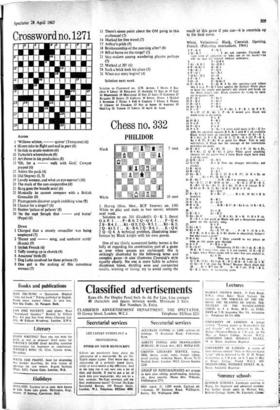Chess no. 332
PHILIDOR
J. Haring (Hon. Men., BCF Tourney no. 110) White to play and mate in two moves; solution next week.
Solution to no. 331 (Guidelli): Q - K 3. threat Q x P. 1 . . P - B 4; 2 Q -Q 4. 1 . . . P - Q 4; 2 13 - B 4. 1 ... Kt -Q 3; 2 Q - B 5. 1 ... Kt - K 3;
2 Q - Kt 5. 1 .. K - B 4; 2 Q - B 4. 1 K - Q 4;
2 Q - Q 4. A technical problem, illustrating inter- ference by Black knight with his own pawns.
One of my (fairly numerous) hobby horses is the folly of regarding the combinative part of a game as over when queens are exchanged; this is strikingly illustrated by the following tense and complex game-it also illustrates Czerniak's style equally clearly. No one is more liable to achieve disastrous losses, dazzling wins and unexpected results, winning or losing; try to avoid seeing the result of this game if you can-it is uncertain up to the final move.
White, VelimiroviC. Black, Czerniak. Opening. French. (Polanitza tournathent, 1964.)
P -4( 3
21 QP --KK 42 . I do not consider Ctetnialt the right kind of opponent to 'take out of the books'-he will do that ft-up _hiQmsael4f without assinance.
3 kt - K B 3 Kt -Q B 3
• P-K'Kt 3 B - K 2 5 - Kt 2 P - Q 4
6 P - Q 3 Kt - B 3
7 Kt - Q 2 0-0 98 0P K0 5 -QKKit 4 p..Kt JO P -K R 4 P - Q R 4 In this opening-and others like it (e.g. P - Q 3 lines against the Sicilian) White plays to hoer the centre and queen's side dosed and break up the Black king's side: Black counters by trying to open up the queen's side.
II P - R 5 P - Kt 5 12 P - R 6 P - Kt 3 13 R i P - R 5 14 Ks - B 1 P - R 6 15 P x P . . 15 P -Kt 3. P - B 3; 16 P X P.
B x P: 17 R - Kt I. P - K 4 would give Black too m.uch scope in the centre. 15
P P
16 P-13 3 P - B 3 17 P x B x P P-Q 4 P XP
19 P X P Q - Kt 3 A more solid move is Kt - 0 3-- with the excellent squares 8 4. K 5 and B 5 all available Black would have an excellent game--since 20 Kt - K 5, B x KO; 21 P x B, Kt - B 2; 22 B - B 4 (22 P - B 4, Ks K R P), F -10 41 es good for Black. Text is only Satisfactory if Black has the courage of bit convictions and takes the pawn.
208-84 -li4 R - R5 20 . . Kt x P; 21 1Ct X Kt. K'; 22 Q Ft - Kt 1 gives White good attacking X K chances for the pawn-but I think Black might have tried it all the same.
21 Q R - Kt 1 - R I 22Qx() B K Q Now the struggle intensifies, not relaxes.
23 R -Kt 6 Kt-EtS
24 R -Q 2 B - B 5 25 Kt - K 3 B - Q 1 25 B x R P7; 26 R x Kt of
25 Kt x Pl; 26 Kt x B.
26. 3".'; 27 11--Q 6! cc 26 . B - K 2; 27 B-R 3. . 26 R - Kt 8 is stronger. e.g. 26 . R -R3: 28 Kt-Kt 5!, B x Kt; 29 B x B (threat R X QKtor B-K 7),l0 -Qa 300 eh.
26 . . n it - s
R x Kt 27 . ..BaB,2$KtxBla
hopeless.
258x8
29 R - 1 - 5!
3I/RxR 30 - R 87. R - Kt ch; 31 K - R 2, 7!
31 B - R 3 KK tt -x135t2!
32 Kt -Kt 4! 328aK1. Rail: 33 BXPeh. K - B I is less good as Black will get a dangerous passed pawn on the queen's wring.
32
33 Kt -K 5 BB 8 34 Kt x K Kt - B 7!? 34 . . P - K 7: 35 R x P, B X R: 36 B X Kt. K X Kt drawn is objectively better- but who wants a draw!
35 8 x Kt P - R 7 Help yourself to my pieces as lows as this pewn gots through. 36 1:1 x P P 37 B - Q 6? . ;Zing 38 Kt - Kt 5 ch. K 1: 39 B -51 5 mate-hut. alas, it ii not correct. 37 R -Q 11 is right. when White waerns still to win-but you analyse It. 37 _ . .
.
K I X ;l
St
Resigns b, not 38 R x Kt %MCC 35, . Qg Rs .. ; 39 Kt-Kt 5c6 K-R 1:40 B-K X.11; 41 Kt - B 7 ch wins for White? Because Black playa not Q .8 mate. A fascinating ganse






































 Previous page
Previous page